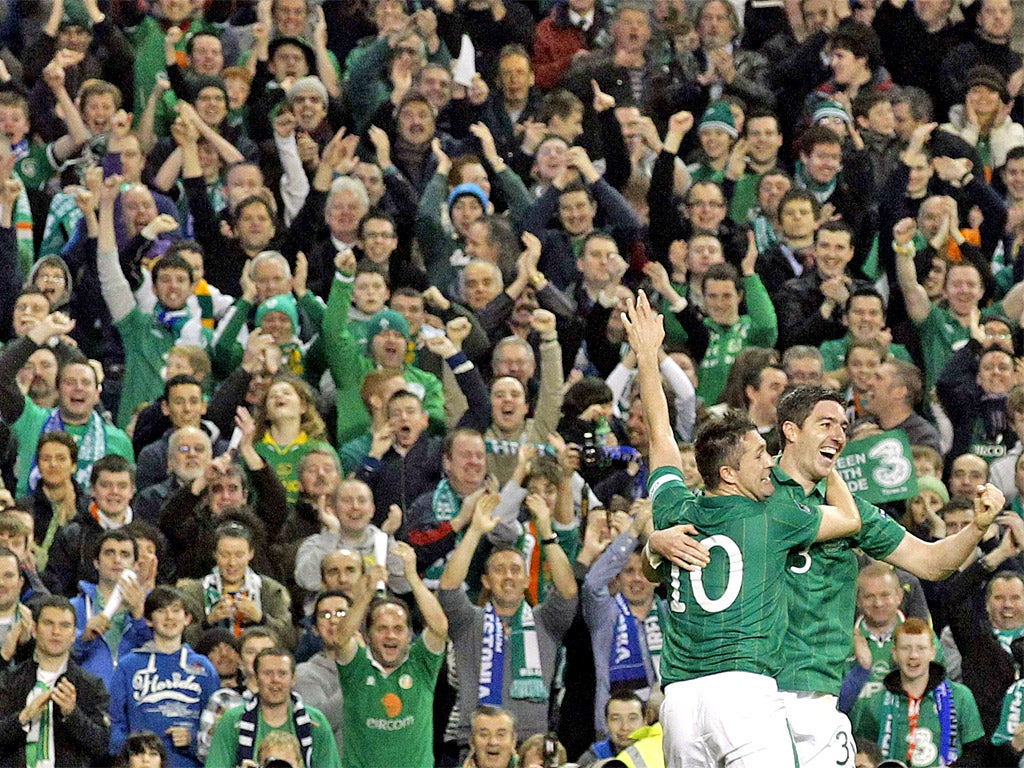Ireland start the party after 10 years of hurt
Republic of Ireland 1 Estonia 1 (Republic of Ireland win 5-1 on aggregate)

Your support helps us to tell the story
From reproductive rights to climate change to Big Tech, The Independent is on the ground when the story is developing. Whether it's investigating the financials of Elon Musk's pro-Trump PAC or producing our latest documentary, 'The A Word', which shines a light on the American women fighting for reproductive rights, we know how important it is to parse out the facts from the messaging.
At such a critical moment in US history, we need reporters on the ground. Your donation allows us to keep sending journalists to speak to both sides of the story.
The Independent is trusted by Americans across the entire political spectrum. And unlike many other quality news outlets, we choose not to lock Americans out of our reporting and analysis with paywalls. We believe quality journalism should be available to everyone, paid for by those who can afford it.
Your support makes all the difference.Two years ago Richard Dunne was sat, crestfallen, on the pitch in Paris. Next to him was Thierry Henry, whose handball had just sent France through to the World Cup. Last night in Dublin, Dunne was jubilant at the final whistle, as a draw with Estonia sent the Republic of Ireland to their first tournament in 10 years. "It's the best experience I've probably had in football," he said. "We've walked around Lansdowne Road a few times with nothing to show for it at the end of campaigns, so to qualify here I think is special for everyone."
For Giovanni Trapattoni, taking Ireland to their first European Championship in a quarter of a century is equivalent to his greatest managerial triumphs. "Qualifying after 25 years is like a big trophy," he said, before attributing it to the team's reaction to that defeat in Paris. "The team improved and they believed what we asked from them. After losing to France in the playoff, the team understood our philosophy and our system."
With a 4-0 lead from the first leg, the celebrations began early. Michael D Higgins, the newly elected president of Ireland, was presented to the players before kick-off but it was not immediately clear who was congratulating whom.
The 90 minutes themselves were not fiercely contested. Goalkeeper Shay Given agreed that the feeling was strange. "It was a little bit, and for the crowd, because we were four goals ahead from the first leg and then five in the first half," he said. "But we're just going to enjoy the atmosphere now."
The Republic were quite clearly buoyed by the occasion. There was none of the inhibition which often characterises their performances, even at home. Rather, the midfield passed and moved intricately from the start, relishing the space afforded to them by their visitors.
Within five minutes, Robbie Keane came close to scoring a reassuring goal. Stephen Hunt pulled a wide free-kick back to Damien Duff, whose low shot was generously palmed back out by Pavel Londak. Keane was in the right place, but shot wide.
Half an hour in, just when the stadium was feeling its first tingles of desire for a goal, Hunt provided them with one. His corner was headed goalwards by Kevin Doyle, and Londak repeated his same palm-out as before. Ireland were too polite to turn down the same favour twice, and Stephen Ward scored. Even given the first-leg lead, this was the final layer of comfort the Aviva Stadium needed.
Estonia now required five unanswered away goals to deny Irish participation in the European Championship. The fans breathed in, and sung out "The Fields of Athenry" in celebration.
With a 5-0 aggregate lead, Ireland could settle into a controlled second-half performance, with Glenn Whelan and Keith Andrews happy to pass it among themselves.
After 12 minutes of the second period, there was even enough comfort for Estonia to score a goal and for it to trouble no one. Konstantin Vassiljev shot from distance and a rare aberration from Given allowed the ball through his arms and into the net.
Keane was soon replaced, and he could go off content in the knowledge that he would be returning to tournament football 10 years after his two famous last-minute equalisers in Japan and South Korea. "It's a great night for everyone – the fans and the players," he said afterwards. "It's a night that we'll never forget. Full credit to everyone who's involved in the squad. This is why we play football, for situations like this."
Dunne, another veteran of 2002, and another man delighted to have a second bite at a major tournament now he is in the latter half of his career, headed a clever free-kick directly at Londak.
Duff, a third member of that same class, was replaced by Keith Fahey after 79 minutes of tireless harrying. Duff seemed to speak for the whole generation when he described it as "even better" than Ireland's qualifying for the 2002 World Cup, "because time is running out for a few of us, so I suppose you appreciate it more now." After the hard work, just relief and delight: every triumphant pass in the final minutes was cheered by the 51,150-strong crowd.
Republic of Ireland (4-4-2): Given; O'Shea, St Ledger, Dunne, Ward; Duff (Fahey, 79), Whelan, Andrews, Hunt (McGeady, 59); Keane (Cox, 67), Doyle. Substitutes not used Westwood, McCarthy, O'Dea, Walters.
Estonia (5-3-2): Londak; Jaager, Rahn, Klavan, Kruglov (Puri, 18), Teniste; Vassiljev, Vunk, Lindpere (Kink, 54); Saag, Voskoboinikov (Purje, 72). Substitutes not used Kotenko, Sisov, Dmitrijev, Barengrub.
Referee B Kuipers (Netherlands).
Join our commenting forum
Join thought-provoking conversations, follow other Independent readers and see their replies
Comments